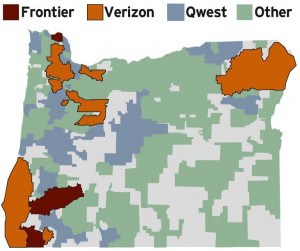 Plans by Frontier Communications to clamp down on “excessive usage” of their DSL service and overcharge customers who exceed 100GB of usage per month brought a strong negative reaction from a consumer group, who called Frontier’s limits “divorced from the underlying economics.”
Plans by Frontier Communications to clamp down on “excessive usage” of their DSL service and overcharge customers who exceed 100GB of usage per month brought a strong negative reaction from a consumer group, who called Frontier’s limits “divorced from the underlying economics.”
Sources also tell Stop the Cap! the company is actively working on changing language in their Acceptable Use Policy that, as of this morning, is still misleading customers in Minnesota about their service.
A Frontier spokesperson also told an Oregon newspaper Frontier’s acquired FiOS service areas are not guaranteed cap-free service — the company may implement some restrictions there as well.
But first, Frontier Communications’ Acceptable Use Policy no longer matches reality for customers in Mound, Minnesota who are getting notified that their service is at risk of being shut off if they don’t agree to new, dramatically-higher priced service plans. But such e-mails run contrary to several sections in the company’s own published policies:
Frontier’s Residential Acceptable Use Policy (Last Update: December 23, 2008) (PDF Archived 4/15)
The Company has made no decision about potential charges for monthly usage in excess of 5GB.
Frontier’s Supplementary “5GB” Addendum to their Acceptable Use Policy (PDF Archived 4/15)
Frontier has not implemented tiered usage plans and will continue to evaluate if and when they would be necessary. If and when Frontier implements a tiered usage plan pricing and usage information will be communicated to all High-Speed customers.
Does Frontier plan to limit my use of the Internet?
Frontier is providing (NOT LIMITING) all customers with a minimum of 5GB of usage on a monthly basis. The Company has made no decision at this time to charge for additional usage but wants to start to educate customers about their usage.
If I hit 5GB will my service be interrupted?
No. Your service will not be interrupted at 5Gb. You will continue to use our High Speed Internet service without disruption.
How will I know how many Gigabytes I am using?
Sometime in the future, Frontier will provide to all customers visibility as to what your usage is on a daily, weekly and monthly basis. We will also provide a the ability to estimate bandwidth usage for different types of activities – like streaming video downloads or file sharing. These tools will give our customers the ability to make informed decisions about broadband usage consumption.
Tell that to the customers in Mound who have 14 or fewer days and counting to either pay extortionist broadband pricing, curtail their usage, or go elsewhere for service (if they can).
It’s no surprise some customers in Mound are outraged when receiving the company’s e-mailed notification about paying higher prices for usage because it runs completely contrary to the published policies of Frontier’s broadband service.
That’s just one more mistake in a series of mistakes Frontier has made in marketing its broadband service, especially in areas where consumers can take their business elsewhere and not have to worry about exceeding Frontier’s minuscule usage allowance.
![]() Wendy Davis at MediaPost quotes a statement released by Free Press research director S. Derek Turner: “While there may be a place for discussing reasonable usage-based billing, the scheme Frontier is testing is completely divorced from the underlying economics. Even worse than their price-gouging is Frontier’s assertion that a mere 5 gigabytes per month is a ‘reasonable’ amount of usage when just last month the National Broadband Plan reported that average Internet users with a fixed connection consume 9 gigabytes of data per month.”
Wendy Davis at MediaPost quotes a statement released by Free Press research director S. Derek Turner: “While there may be a place for discussing reasonable usage-based billing, the scheme Frontier is testing is completely divorced from the underlying economics. Even worse than their price-gouging is Frontier’s assertion that a mere 5 gigabytes per month is a ‘reasonable’ amount of usage when just last month the National Broadband Plan reported that average Internet users with a fixed connection consume 9 gigabytes of data per month.”
Davis also managed to get a Frontier spokesperson on the record about the debacle, telling MediaPost, “the company is only trying to prevent some exceptionally heavy bandwidth users from degrading service for others on the network. She also says that people who received the letters were given an option of decreasing their bandwidth consumption or switching to a different, higher-priced plan.”
Yet the concept of DSL customers degrading the broadband experience of other customers on the network is itself controversial, as DSL providers have always emphasized they do not suffer from slowdowns like shared networks used by cable broadband providers. While heavy consumption can theoretically congest “middle mile” networks that serve regional areas or connect telephone company switching offices, those congestion issues are not difficult to address when companies use fiber connections to connect them, as Frontier frequently does. Indeed, Frontier is far more likely to suffer congestion issues when millions of former Verizon customers are piled on Frontier’s network.
Nowhere in Frontier’s e-mail does it tell customers they can reduce usage to retain service. It only says “if you do not wish to switch to this new rate plan, you can have your service disconnected.” Mound residents are faced with the prospect of immediately reducing usage from 100GB to just 5GB to stay within Frontier’s terms and conditions. Under those conditions, they could do better with dial-up.
 Meanwhile, those soon-to-be-discarded Verizon customers facing a transition to Frontier Communications may soon find themselves potentially impacted by some sort of usage limit as well, which could also apply to the areas served by FiOS.
Meanwhile, those soon-to-be-discarded Verizon customers facing a transition to Frontier Communications may soon find themselves potentially impacted by some sort of usage limit as well, which could also apply to the areas served by FiOS.
Mike Rogoway at The Oregonian talked with Frontier spokesman Steven Crosby about Frontier’s plans:
I talked this afternoon with Frontier spokesman Steven Crosby, who said there won’t be tight bandwidth restrictions after Frontier acquires FiOS — but he indicated that there may be some restrictions.
Currently, Frontier’s user agreement sets a nominal 5 gigabyte cap on monthly bandwidth usage.
“You know, I know and everyone knows that’s a very low number,” Crosby said. “We don’t hold people to that.”
The letters that went out in Minnesota went to a small group of very heavy bandwidth users in one community, Crosby told me. It’s not meant to reflect a broader policy.
As Frontier prepares to take over Verizon’s operations in Oregon and other states — Crosby says the deal is on track and likely to close in late June or early July — Frontier is reviewing its Internet use policies.
I pointed out Comcast’s bandwidth cap, and told Crosby that it seems likely his company will do something similar. He left that possibility open, but said any Internet limits are still under discussion.
“I don’t know what that limit will be,” he said. “The one thing I do know is we don’t want to impact our customers.”
St0p the Cap! responds:
- This is the first time Frontier has hinted that usage limits could eventually apply to the FiOS fiber-to-the-home service it is acquiring from Verizon, a network constructed to manage 21st century broadband traffic Frontier now also seems willing to limit;
- Frontier does hold people to the 5GB usage cap when they are in violation of it, using it as an excuse to expose customers to far-higher-priced service plans or service disconnection. If Frontier isn’t serious about it, why retain the language in customer agreements?
- If Frontier’s Mound e-mail notifications do not reflect a broader policy, than the only customers who will see a change in the Acceptable Use Policy will be those in the Mound, Minnesota area. If customers elsewhere see a change, it -does- reflect a broader policy after all.
- As part of Frontier’s “review of Internet use policies,” the company should not defray expenses surrounding the Frontier-Verizon deal by dumping them on broadband customers with outrageously punitive pricing plans.
- As for not wanting to impact customers, our response is “too late.” Frontier’s original introduction of the 5GB usage allowance in the summer of 2008 impacted customers far and wide, and for its largest service area — Rochester, NY, gave Time Warner Cable happy hunting grounds to experiment with a usage cap of their own.
Wendy Davis at MediaPost offers some food for thought:
Frontier’s letters could well trigger regulatory or judicial scrutiny, especially given the seeming disconnect between the company’s acceptable use policy and its recent actions.
Of course, the underlying problem is the lack of competition. If consumers had more options for broadband providers, a company that threatened to disconnect its customers, or charge $99 or $250 a month for broadband service, might quickly find itself dealing with more pressing problems than public criticism.


 Subscribe
Subscribe






